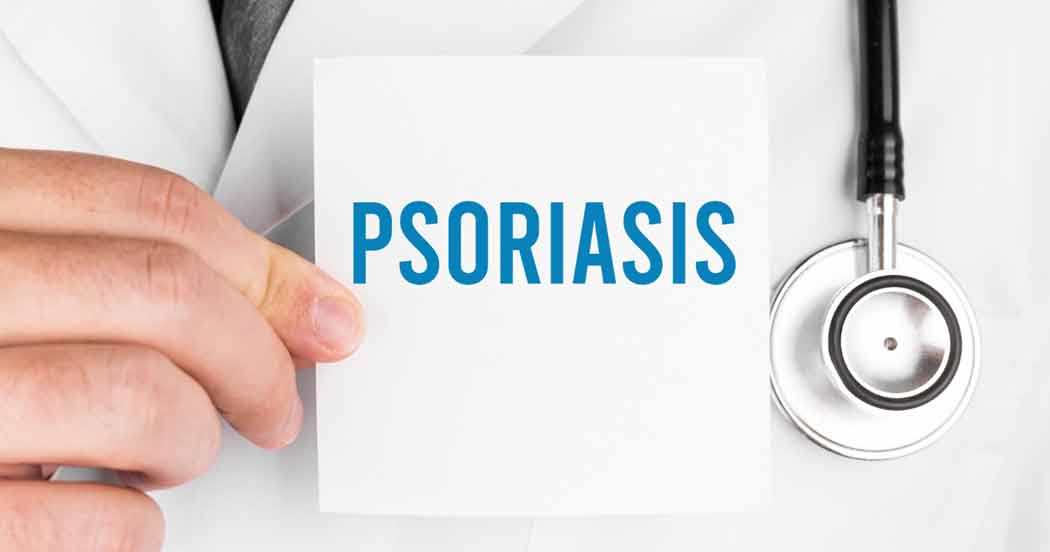What exactly is psoriasis?
Psoriasis is a chronic and long-lasting skin disease characterized by scaling and inflammation. Scaling occurs when cells in the outer layer of the skin reproduce faster than normal and pile up on the skin’s surface.
Psoriasis affects approximately 2.2% of the United States population, or about 7.5 million people. Although the disease occurs in all age groups and about equally in men and women, it primarily affects adults. People with psoriasis may suffer discomfort, including pain and itching, restricted motion in their joints, and emotional distress.
In its most typical form, psoriasis results in patches of thick, red skin covered with silvery scales. These patches, which are sometimes referred to as plaques, usually itch and may burn. The skin at the joints may crack. Psoriasis most often occurs on the elbows, knees, scalp, lower back, face, palms, and soles of the feet, but it can affect any skin site. The disease may also affect the fingernails, the toenails, and the soft tissues inside the mouth and genitalia. About 15% of people with psoriasis have joint inflammation that produces arthritis symptoms. This condition is called psoriatic arthritis.
What causes psoriasis?
In about one-third of the cases, psoriasis is inherited. Researchers are studying large families affected by psoriasis to identify a gene or genes that cause the disease. (Genes govern every bodily function and determine the inherited traits passed from parent to child.)
People with psoriasis may notice that there are times when their skin worsens, then improves. Conditions that may cause flare-ups are called “triggers” and include changes in climate, infections, stress, and dry skin. Also, certain medicines, most notably beta-blockers, which are used to treat high blood pressure, and lithium or drugs used to treat depression, may trigger an outbreak or worsen the disease.
How can psoriasis affect the quality of life for sufferers?
- Nearly 60% of people with psoriasis reported their disease to be a large problem in their everyday life.
- Nearly 40% with psoriatic arthritis reported their disease to be a large problem in everyday life.
- Patients with moderate to severe psoriasis experienced a greater negative impact on their quality of life.
- Psoriasis has a greater impact on quality of life in women and younger patients.
What is the age of onset for psoriasis?
- Psoriasis often appears between the ages of 15 and 25, but can develop at any age.
- Psoriatic arthritis usually develops between the ages of 30 and 50, but can develop at any age.
What is the cost of having psoriasis?
- Total direct and indirect healthcare costs of psoriasis for patients are calculated at $11.25 billion annually, with work loss accounting for 40% of the cost burden.
- Approximately 60% of psoriasis patients missed an average of 26 days of work a year due to their illness.
What are the genetic aspects of psoriasis?
- About one out of three people with psoriasis report having a relative with psoriasis.
- If one parent has psoriasis, a child has about a 10% chance of having psoriasis. If both parents have psoriasis, a child has approximately a 50% chance of developing the disease.
What are some promising areas for psoriasis research?
In addition to the specific organizations below, check out our Additional Information section for other organizations that contribute to the research of psoriasis.
How can people contribute to psoriasis research?
National Psoriasis Tissue Bank
Baylor University Medical Center
Suite 656, Wadley Tower
3600 Gaston Avenue
Dallas, TX 75246
Phone: (214) 820-2635
Fax: (214) 820-1296
Where can people find more information about psoriasis?
The National Institute of Arthritis and Musculoskeletal and Skin Diseases Information Clearinghouse, a public service sponsored by the National Institute of Arthritis and Musculoskeletal and Skin Diseases (NIAMS), provides information about various forms of these diseases. The clearinghouse distributes patient and professional education materials and also refers people to other sources of information:
1 AMS Circle
Bethesda, MD 20892-3675
Phone: (301) 495-4484
Fax: (301) 718-6366
TTY: (301) 565-2966
Why is there a warning on some of the products about containing chemicals known to the State of California to cause Cancer?
This warning pertains to coal tar, the active ingredient in a number of MG217 Psoriasis products, and is a requirement of the State of California. However, an expert advisory panel of the US FDA has recognized coal tar to be a safe and effective treatment for psoriasis when used as directed. The FDA does not share the opinion of the State of California that this warning should be present.
Acknowledgments
The NIAMS gratefully acknowledges the assistance of Alan N. Moshell, M.D., of NIAMS; Gerald G. Krueger, M.D., of the University of Utah; Robert Stern, M.D., of Beth Israel Deaconess Medical Center in Boston, MA; in the review and update of this fact sheet.
The National Institute of Arthritis and Musculoskeletal and Skin Diseases (NIAMS), a part of the National Institutes of Health (NIH), leads the Federal medical research effort in arthritis and musculoskeletal and skin diseases. The NIAMS supports research and research training throughout the United States, as well as on the NIH campus in Bethesda, MD, and disseminates health and research information. The National Institute of Arthritis and Musculoskeletal and Skin Diseases sponsored by the NIAMS provides health information and information sources.
We wish to acknowledge The National Institute of Arthritis and Musculoskeletal and Skin Diseases (NIAMS), a part of the National Institutes of Health (NIH), and psoriasis.org for the information presented on this page.
